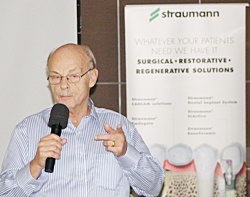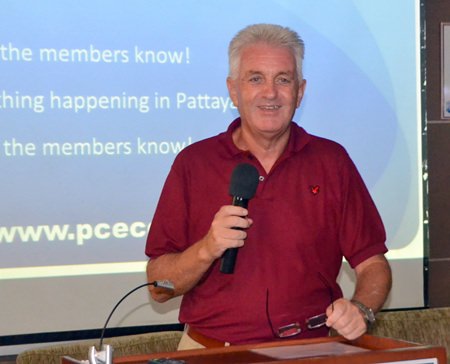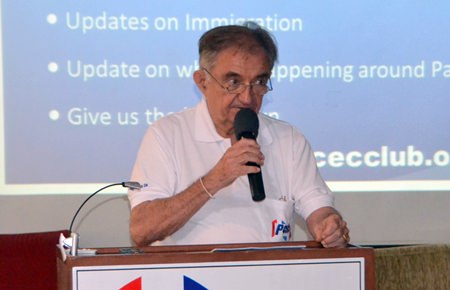If you are going to build your family tree, there is plenty of information available on the Internet for some parts of the world, but watch out for the sites that require payment. They will get you every time.
Member Ian Frame talked about family trees at the Sunday, June 7 meeting of the Pattaya City Expats Club (PCEC). Ian has organised a PCEC special interest group on genealogy and edits a newsletter that currently goes out to 66 people that have an interest in building their own family tree.
Ian previously gave a presentation on the subject when he described the process he followed in learning his ancestry on his father’s side. For this presentation, he described how he used the process to research his mother’s side of the family.
 PCEC Member Ian Frame describes the various methods that can be used to research your ancestry, but cautions his audience not to use search sites that require payment.
PCEC Member Ian Frame describes the various methods that can be used to research your ancestry, but cautions his audience not to use search sites that require payment.
For people from the U.K., Ian said, it is usually possible to trace the family tree back a few hundred years or more, but it is a labour intensive exercise. Some days, he conducts his research from early in the morning to 10 pm and he has to force himself to stop. He believes the search is much more interesting if one also looks at the time period, the locations, housing, means of transport, and events of historical importance. For example, Ian said that he tries to figure out what events or economic trends caused his ancestors to move from one part of Scotland to another.
Ian mentioned that his maternal grandfather happened to be named James Bond, so it was interesting to see how many people had the same name. Ian theorized that Ian Fleming got the idea for the name “James Bond” for his spy novels from his grandfather, but said that his theory was quickly debunked. In reality, Ian Fleming took the name from an American ornithologist named James Bond, a Caribbean bird expert and author of the definitive field guide Birds of the West Indies. Ian explained that Fleming based his fictional creation on a number of individuals he came across during his time in the Naval Intelligence Division during World War II, and that Bond was a compound of all the secret agents and commando types he met during the war.
In addition to putting together a Bond family tree, Ian also did one for his maternal grandmother’s family, the Langtons.
 PCEC Member Jim Jones presents the Club’s Certificate of Appreciation to Ian Frame for his interesting talk about building a family tree.
PCEC Member Jim Jones presents the Club’s Certificate of Appreciation to Ian Frame for his interesting talk about building a family tree.
There are a number of sites on the Internet that one can use to help trace ancestors. Many of them charge fees. Being Scottish, Ian said, he tries to avoid these. Often, these pay sites lead you on by offering a free search; once you conducted the search the site will tell you the number of results, but if you want to see them, you then have to pay to get them.
Ian provided a list of free sites that he has found very helpful: http://histfam.familysearch .org/searchform.php; https://familysearch.org/search, http://www.freebmd.org.uk/cgi/search.pl; http://www. thepeerage.com/index.htm; http://www.findmypast .co.uk/search; http://www. genesreunited.co.uk/search
The Mormon family search site (www.searchforancestors .com/mormongenealogy .html) provides very useful information, Ian explained, and not just about Mormons. Ian noted that one of its search features has been out of service for several months.
 Member Tony Heron conducts the Open Forum portion of the PCEC meeting where the audience may ask questions or offer information about expat living in Pattaya.
Member Tony Heron conducts the Open Forum portion of the PCEC meeting where the audience may ask questions or offer information about expat living in Pattaya.
The source of information that is perhaps the most useful for U.K. searches are the censuses that were done every ten years since 1801 (with the exception of 1941). The U.S. has also done a census every decade since 1790. Other sources of information include the passenger lists of large ships; immigration records; post office directories; workhouse and poorhouse records; and prison records.
A good place to start building the family tree is to select someone born between 1800 and 1900, Ian said. Further, that while he finds family trees fascinating, his brother has no interest in it whatsoever and cannot understand what Ian sees in it. Most families are like that, Ian said; one family member takes an interest while most of the others just yawn.
Ian likes to collect old photographs as he conducts his search. He showed several photos as part of his presentation. He showed a photo of Deanston Mill, a cotton, spinning and weaving mill in Kilmadock, Scotland, where his grandfather went to get work as it was then and another of the same building today (now a distillery). Other period photos that Ian showed, all from Scotland, included the Motherwell Steelworks in Dalzell, a shipyard in Govan; and the town of Airdrie in 1900.
 Board Member Lawrie McLoughlin explains the process for nominating members to the Governing Board in advance of the PCEC’s Annual General Meeting on July 5, 2015.
Board Member Lawrie McLoughlin explains the process for nominating members to the Governing Board in advance of the PCEC’s Annual General Meeting on July 5, 2015.
Ian said that he remembered living in Dalzell as a kid in the 1950s. The smog was so thick that you couldn’t see the traffic lights from your car. Ian described how his mother used to get out of the car and walk to the traffic light. When it turned green, she ran back to the car to tell her husband that it was okay to go. Ian also showed a photo of London from the late 19th century.
In response to a question regarding records for ancestors from Eastern Europe, Ian said that it was harder to find information because many records were destroyed in the war. Also, people emigrating to the U.S. often had their names misspelled by immigration officials or voluntarily changed their names to make them sound more “American.”
After the presentation, MC Richard Silverberg brought everyone up to date on upcoming events and called on Tony Heron to conduct the Open Forum, where questions are asked and answered about Expat living in Thailand, especially Pattaya.
For more information on the PCEC’s many activities, visit their website at www.pcecclub.org.




